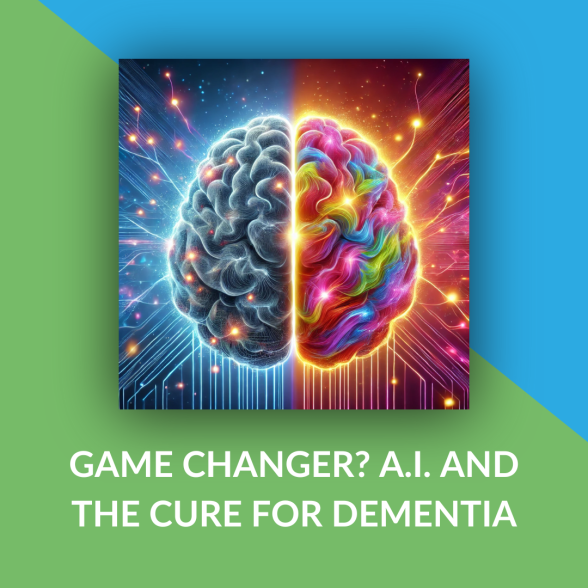A.I. is becoming a powerful tool in the fight against dementia.
A 2024 study from the University of Cambridge revealed that A.I. could predict whether someone with Young Onset Dementia would progress to Alzheimer’s with an 82% accuracy rate, significantly outperforming traditional methods.
(Below, an artistic rendering of a brain clouded by amyloid plaques, with darkened areas showing where the disease takes hold.)

The ability to personalize care is one of AI’s greatest strengths. By identifying high-risk individuals early, doctors can prioritize those who need closer monitoring or immediate intervention, while sparing others from invasive tests.
For example, picture an A.I. interface visually mapping a patient’s brain scan, highlighting vulnerable areas before symptoms manifest. An artistic rendering might depict neurons illuminated by AI, while others darken as the disease progresses, showcasing the potential to intervene before irreversible damage occurs.

Beyond Diagnostics:
AI’s role also extends beyond diagnostics into drug discovery; researchers at Emerging Technologies in the U.K are using AI to analyze genetic data by identifying which genes are responsible for forming harmful plaques in the brain. One could imagine an artistic depiction of this process: a vibrant, colorful network of neurons being overtaken by creeping black plaques, for AI to spotlight the critical genes behind the changes, offering a window of hope to prevent further decline.
Further, AI speeds up drug development by simulating interactions between compounds and these genetic targets. Imagine a digital rendering of this process—thousands of molecules swirling through a visual neural network, searching for the key to stopping Alzheimer’s; several of these promising compounds are already moving into clinical trials.
Such innovations, backed by leading institutions like the National Institutes of Health and Cambridge University, U.K., are opening new doors in dementia care, paving the way for early diagnoses, personalized treatments, and faster drug discovery.
Visually, this might be represented by a brain slowly restoring its healthy glow as AI-driven treatments work to reverse damage, signalling hope for millions affected by Alzheimer’s.
In Conclusion: “Of The People, By The People”
Ultimately, even as cutting edge medical and technical institutions glean evermore more insights towards an actual cure for Dementia, in the meantime, there’s another health barrier gap that needs to be filled, yet remains for those of us who live with Dementia everyday—our own agency in the world — towards aiding and advocating for those of us with Dementia through emphatic and progressive social healthcare measures, acting as vital support structures to facilitate a life more independently led.
